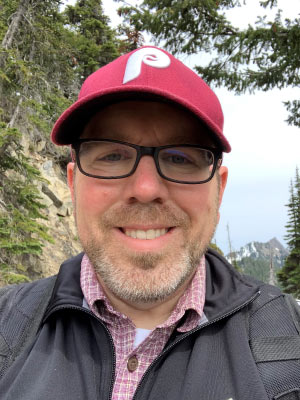
Sharing the benefits of natural climate solutions is at the heart of Nelson Institute alumnus Nathan Henry’s work, but it wasn’t long ago that he had an entirely different career. For most of his career, Henry worked as a political consultant, but in 2018 he decided to make a mid-career change and delve into environmental conservation. Before making the transition, however, Henry wanted to continue his education and gain skills in environmental studies, so he applied for and was accepted to the Nelson Institute Environmental Conservation MS program.
“I wanted to get some applied knowledge to support this career change,” Henry said. “One of the things that is really great about the Nelson program is that it gets you in and out. It’s intense, but you’re able to get the coursework done in a reasonable time period along with having some applied project experience. I have two kids and I’m not in a situation where I can go to graduate school for years and be without an income, so this was a good fit.”
The Environmental Conservation MS program includes a 15-month, 32-credit blended learning curriculum designed to train conservation leaders in practical interdisciplinary skills. The program features in-person and online courses as well as a three-month professional leadership experience where student engage directly with conservation organizations and practitioners, helping to solve some of the most urgent challenges in biodiversity conservation and environmental protection.
For his professional leadership experience, Henry worked with The Nature Conservancy in Portland, Oregon.
“There’s a lot of flexibility on deciding which organization you work with. So, I ended up doing placement with the Nature Conservancy in Oregon, focusing on natural climate solutions that sequester carbon on natural and working lands,” Henry said. “The work was mostly policy-focused and included an analysis of polices in Oregon. To me, this project was very helpful because it gave me an introduction into the non-profit space. One of the things I like about The Nature Conservancy is they’re a big organization and they have a science team, they do communication, they do advocacy, and they have a broad-based mission. So, the fact that the Nelson Institute was able to facilitate a placement with them, which ultimately led to the position I have now, was extraordinarily helpful.”
Henry currently works as the U.S. Project Manager at U.S. Nature4Climate , and is based in Portland, Oregon. U.S. Nature4Climate is a coalition of nine organizations, including The Nature Conservancy, who are “dedicated to ensuring our forests, farms, ranches, grasslands and wetlands are an important part of the overall strategy to combat climate change.”
“Our job is to increase the attention paid to natural climate solutions as a climate mitigation strategy,” Henry said. “There’s more and more momentum behind climate action, but a lot of the focus is on the decarbonizing the transportation and energy sectors. Our perspective is that you absolutely need to do those things, but we probably aren’t going to meet our overall climate goals unless we also figure out how to sequester more carbon in forests and farmlands as well. My job is to manage the many organizations who are all on the same page about the overall goal, but each have their own perspective. For example, some are focused on agriculture, others wetlands, some are businesses. So, I work on messaging that helps us all to effectively communicate on the issue.”
One aspect of Henry’s job is writing for the U.S. Nature4Climate’s blog. The stories include a variety of topics, but a recent example of these stories includes the blog “Addressing Climate Change One Beer at a Time,” which highlights a partnership between Patagonia Provisions, Hopworks, and The Land Institute. Together, they utilized a long-rooted perennial grain called Kernza, which requires less water, tilling, and stores more carbon in the ground (carbon sequestration) than other grains, to create a new, more ecofriendly beer. Henry says it’s stories like these that are going to make a big difference in moving climate solutions forward.
“If the science alone were enough, we would have addressed this climate change issue a long time ago. Instead, we really need to show people how this works. For example, what could a landowner or a company do that would have climate benefits?” said Henry. “So, the beer story shows that there is innovation going on that can help us sequester carbon. It also highlights a real-world situation where people are using these innovative techniques. We wanted to highlight that researchers and businesses are working together to bring this to market.”
In addition to his work on the website and blog, Henry also speaks with business leaders, policymakers, and communities about the importance of natural climate solutions. In fact, everything came full circle recently when Henry spoke at the Nelson Institute Earth Day learning event, sharing a bit about carbon sequestration and how these natural climate solutions can help us to meet carbon goals.
For Henry, this mid-career transition has been a success and he is thankful for the role that the Nelson Institute programs played in that. Henry is enjoying his job with U.S. Nature4Climate, mixing his skills as a political consultant with the skills he learned at the Nelson Institute.
Henry said, “This job is a really good fit for me because it has a focus on climate change, but also it really taps into the strategic communication skills I learned as a political consultant.”
Learn more about the Environmental Conservation MS and how you can support the program